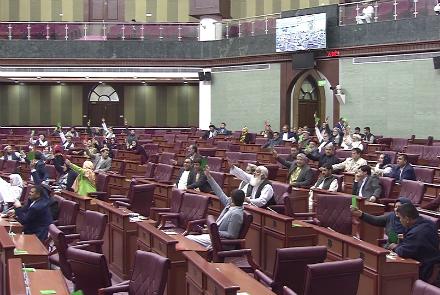The majority of MPs in the Wolesi Jirga on Wednesday voted against the 10 percent tax levy against mobile phone users – a levy introduced in 2015.
Members of the Wolesi Jirga’s Telecommunication Commission, who carried out an investigation into the tax collection process, said the Ministry of Communication and Information Technology should have collected 14 billion AFs in the past two years.
However, according to the commission, only about 7.9 billion AFs was collected during this period.
The commission also claimed that the process lacks transparency and monitoring.
“The continuation of the process of collecting 10 percent tax from telecommunication services customers has resulted in money not going to government’s treasury and instead the public’s money is being wasted,” said Qais Hassan, head of the Wolesi Jirga’s Telecommunication Commission.
“The money which is collected from the people is pouring into the accounts of private companies but it does not go to the government’s treasury,” said Musa Nusrat, a member of the commission.
At Wednesday’s session, the Wolesi Jirga members cancelled the tax collection process after a majority vote. They said this was because the process was not transparent and did not meet the required norms.
Meanwhile, some members of parliament said mobile phone vouchers were being imported into the country without the required duties being paid.
“Many containers of voucher cards are coming in to Kabul and are sold to the people without taxes (being paid),” said Abdul Rahim Ayubi, an MP.
“We asked ATRA (Telecom Regulatory Authority of Afghanistan) officials how they evaluate the process. They said that they are only a few staff and accept what the telecommunication companies say. They said they don’t have proper equipment (for this task),” said Khalilullah Shaheedzada, an MP.
The ministry of communication and information technology failed to comment on the issue.
In the past however, the ministry has repeatedly stated that the tax collection process was being carried out transparently.

